56 citations,
November 2007 in “Molecular and cellular endocrinology” Two enzymes regulate androgen receptor activity, affecting treatments for androgen insufficiency and benign prostatic hyperplasia.
 June 2020 in “Journal of Dermatological Treatment”
June 2020 in “Journal of Dermatological Treatment” Use telemedicine and strict hygiene for safe hair and scalp treatments during COVID-19.
 7 citations,
January 2018 in “Medicinski arhiv”
7 citations,
January 2018 in “Medicinski arhiv” A herbal extract may help treat certain types of hair loss by reducing a specific gene's activity.
 39 citations,
August 2021 in “JAAD International”
39 citations,
August 2021 in “JAAD International” COVID-19 patients often experience hair loss and scalp pain, which may be related to the severity of their infection and treatment drugs.
 25 citations,
July 2021 in “Journal of Medical Virology”
25 citations,
July 2021 in “Journal of Medical Virology” COVID-19 can cause various skin issues, including rashes and hair loss, which usually heal on their own and don't always indicate severe illness.
 September 2021 in “CRC Press eBooks”
September 2021 in “CRC Press eBooks” Telogen effluvium is a type of hair loss that happens when stress or illness causes many hairs to enter the resting phase and fall out.
 14 citations,
April 2021 in “Clinical, Cosmetic and Investigational Dermatology”
14 citations,
April 2021 in “Clinical, Cosmetic and Investigational Dermatology” COVID-19 may trigger sudden temporary hair loss.
 1 citations,
January 2021 in “Dermatologic Therapy”
1 citations,
January 2021 in “Dermatologic Therapy” Trichobiolight effectively treats hair loss with 82.5% success.
 20 citations,
June 2015 in “Hormone Molecular Biology and Clinical Investigation”
20 citations,
June 2015 in “Hormone Molecular Biology and Clinical Investigation” Finasteride worsens erectile dysfunction and lowers testosterone in men with enlarged prostates, unlike tamsulosin.
 6 citations,
January 2021 in “Journal of Cosmetic Dermatology”
6 citations,
January 2021 in “Journal of Cosmetic Dermatology” Poor sleep during the pandemic may increase stress and worsen hair loss conditions.
 8 citations,
March 2020 in “Dermatologic Therapy”
8 citations,
March 2020 in “Dermatologic Therapy” The new hair loss treatment kit was safe and improved hair growth without any adverse effects.
 8 citations,
May 2020 in “Anais Brasileiros de Dermatologia”
8 citations,
May 2020 in “Anais Brasileiros de Dermatologia” Higher levels of ischemia-modified albumin in telogen effluvium patients may indicate oxidative stress.
 29 citations,
November 2018 in “Journal of The European Academy of Dermatology and Venereology”
29 citations,
November 2018 in “Journal of The European Academy of Dermatology and Venereology” Personality traits and anxiety affect hair loss patients' quality of life.
5 citations,
August 2019 in “Anais Brasileiros De Dermatologia”  March 2019 in “Zenodo (CERN European Organization for Nuclear Research)”
March 2019 in “Zenodo (CERN European Organization for Nuclear Research)” Both Ayurvedic treatments improved hair fall, with Shirodhara being especially effective.
 1 citations,
January 2019 in “Turk Dermatoloji Dergisi”
1 citations,
January 2019 in “Turk Dermatoloji Dergisi” Oxidative stress is likely important in causing telogen effluvium, and antioxidants might help treat it.
 32 citations,
December 2017 in “International Journal of Molecular Sciences”
32 citations,
December 2017 in “International Journal of Molecular Sciences” Low vitamin D might be linked to certain types of hair loss, and supplements could help, but more research is needed.
 January 2018 in “Surgical and Cosmetic Dermatology”
January 2018 in “Surgical and Cosmetic Dermatology” The method is effective for evaluating hair loss treatments quickly and affordably.
 2 citations,
March 2016 in “Obstetrics and Gynecology Clinics of North America”
2 citations,
March 2016 in “Obstetrics and Gynecology Clinics of North America” The document says that common skin conditions in adult women can be treated effectively, with acne being the most common and early-detected melanoma having a high survival rate.
 5 citations,
March 2017 in “Biomedical and Pharmacology Journal”
5 citations,
March 2017 in “Biomedical and Pharmacology Journal” Certain growth factors significantly affect hair loss in women with telogen effluvium.
 10 citations,
January 2017 in “Skin appendage disorders”
10 citations,
January 2017 in “Skin appendage disorders” Emotional stress can trigger intermittent hair loss in chronic telogen effluvium, which may not improve with treatment if stress continues.
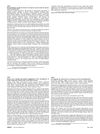 April 2016 in “Journal of The American Academy of Dermatology”
April 2016 in “Journal of The American Academy of Dermatology” Certain scalp tissue features can predict how well alopecia areata responds to steroid injections.
 January 2016 in “International Journal of Medical Research and Health Sciences”
January 2016 in “International Journal of Medical Research and Health Sciences” People with hair loss conditions like Telogen Effluvium and Alopecia Areata often feel scalp pain and are more likely to have anxiety, but not necessarily depression.
 16 citations,
January 2015 in “Annals of Dermatology”
16 citations,
January 2015 in “Annals of Dermatology” The study found specific hair and scalp patterns for different types of hair loss in Koreans, noting racial differences affect diagnosis.
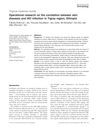 September 2015 in “International Journal of Dermatology”
September 2015 in “International Journal of Dermatology” Skin diseases are common in HIV patients and could help detect HIV early in Ethiopia.
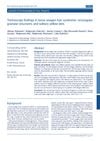 18 citations,
March 2015 in “Journal of Dermatological Case Reports”
18 citations,
March 2015 in “Journal of Dermatological Case Reports” Rectangular black granules, solitary yellow dots, and mostly single-hair follicles suggest Loose Anagen Hair Syndrome.
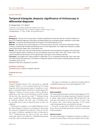 24 citations,
September 2014 in “Journal of the European Academy of Dermatology and Venereology”
24 citations,
September 2014 in “Journal of the European Academy of Dermatology and Venereology” Trichoscopy is reliable for diagnosing Temporal Triangular Alopecia and can prevent unnecessary biopsies and wrong treatments.
 2 citations,
January 2014 in “Journal of clinical and investigative dermatology”
2 citations,
January 2014 in “Journal of clinical and investigative dermatology” Some drugs used to treat immune conditions may cause different types of hair loss.
 2 citations,
August 2014 in “PubMed”
2 citations,
August 2014 in “PubMed” Losartan may help treat Postural Orthostatic Tachycardia Syndrome (POTS) symptoms.
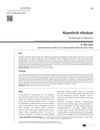 1 citations,
March 2014 in “Turkderm”
1 citations,
March 2014 in “Turkderm” Trichoscopy helps tell different hair loss types apart using specific scalp and hair patterns.



























